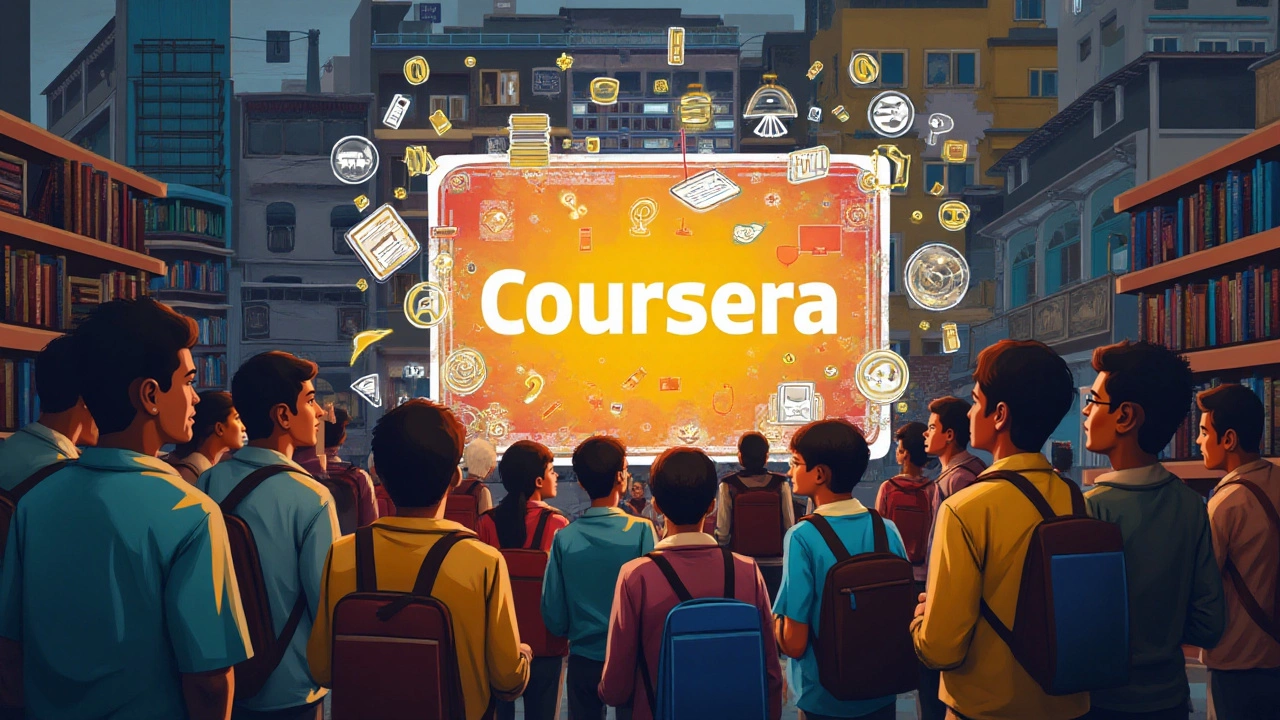In the fast-paced world of digital learning, Coursera stands out by offering a range of subscription plans tailored to fit diverse learners. As 2025 unfolds, its mission to provide quality education from top universities and companies continues unabated. But, how much does it actually cost to access this wealth of knowledge?
Whether you're aiming to upskill for career advancement or indulge in a newfound passion, understanding the pricing structure is crucial. In this article, we will explore the various monthly subscription options Coursera offers. We'll also share insights on how to leverage the platform's potential without breaking the bank.
- Understanding Coursera's Subscription Options
- Monthly Costs and Benefits
- Free Courses and Audit Options
- Specializations and Professional Certificates
- Financial Aid and Scholarships
- Tips for Making the Most of Your Subscription
Understanding Coursera's Subscription Options
Coursera offers a variety of subscription options, each crafted to suit different learning objectives and timelines. This flexibility is one of the platform's greatest strengths. For those new to online learning, it might be surprising how personalized the experience can be. To start with, individual courses can often be audited for free, allowing learners to access video lectures and some course material without any cost. However, if you want to earn a certificate, Coursera typically charges a fee, which varies depending on the course and the institution offering it.
The monthly subscription model is perhaps the most popular among serious learners aiming to complete multiple courses. This is part of their Coursera Plus plan, which for a consistent monthly payment, grants unlimited access to thousands of courses, specializations, and professional certificates. As of the most recent data, this commitment-free option costs around $59 per month, allowing learners to explore as many courses as they can manage during their subscription period. An annual subscription is also available, offering a discount and is priced at about $399, making it a solid choice for avid learners committed for the long haul.
For those interested in curated learning paths, Coursera's specialization options allow you to delve deeper into specific topics. These are multi-course programs that enable mastery over the subject area, complete with hands-on projects and final capstone projects. Usually lasting a few months, specializations can be accessed via a monthly subscription until completion. This makes them ideal for developing in-depth skills in high-demand areas like data science or business analytics. As an interesting starting point, many specializations offer a free trial for seven days, so you can gauge the course suitability before opting into a paid plan.
"Education is the passport to the future, for tomorrow belongs to those who prepare for it today." – Malcolm X
Professional certificates are another feature that underscores Coursera's dedication to lifelong learning. Endorsed by major industry players like Google and IBM, these programs are designed to provide learners with job-ready skills in under six months, on average. These prestigious certificates can be a gateway to employment in today's competitive landscape, particularly in IT-related fields. Again, these are available through monthly subscriptions, allowing learners to control their pace according to personal and professional demands. The cost is generally determined by the duration of completion, but offers flexibility in pacing, making it an attractive package for those needing new career credentials swiftly.
Coursera also caters to businesses and institutions through enterprise and campus solutions, which can be a boon for organizational growth. By using tailored solutions, companies can upskill their workforce or academic institutions can integrate Coursera courses into their curriculums. This strategy not only nourishes employee and student expertise but also broadens the reach of Coursera's offerings. Whether you're a curious individual, a school, or an entire organization, understanding Coursera’s array of subscription options ensures that this venerable platform foments the fires of education and skill development.
Monthly Costs and Benefits
Diving into the realm of Coursera's offerings, understanding its subscription cost is a critical part of choosing the right educational path. Coursera presents its users with a multitude of plans, crafted to cater to the varied spectrum of their learning journeys. The most commonly opted plan is the Coursera Plus Monthly, which for approximately $59, provides unlimited access to thousands of courses, guided projects, and even some specializations. This model is fascinating because it allows passionate learners the freedom to explore numerous topics without feeling the pinch in their wallets each time they enroll in a new course. Such flexibility is particularly beneficial for individuals eager to dive into learning without being tied down by economics.
Each course or specialization on Coursera is backed by renowned institutions or companies, ensuring that every penny spent translates into high-quality education. Delving deeper into the numbers, it's notable that Coursera's individual courses can range significantly in price starting from $29 and going up to $99 each, depending on the subject matter and depth of study. Therefore, opting for a Coursera Plus Monthly subscription not only enhances the learning experience but also proves to be a prudent financial decision for those whose thirst for knowledge isn't just confined to one subject area. This ensures a return on investment that is considerably higher when each course's price is considered separately.
E-learning becomes even more attractive when we add features like certificates upon course completion. These certificates hold intangible value as they adorn résumés and LinkedIn profiles, capturing the attention of potential employers and making a mark in professional circles. According to a 2023 report by the World Economic Forum, nearly 73% of Coursera's certificate holders experienced tangible career benefits such as promotions or new roles. It's statistics like these that underscore the real-world relevance and impact of Coursera's offerings. Moreover, the addition of graded assignments and peer assessments offers learners the chance to put theory into practice, validating their skills immediately.
For strategic learners, combining the benefits of unlimited course access with the assurance of certificates can mean propelling their career while indulging in personal growth. Given such advantages, it's not hard to see why many choose the monthly subscription. The considered decision-making that goes into such choices often reflects a learner's ambition to acquire versatile skills across multiple fields in a rapidly evolving job market.

Free Courses and Audit Options
The beauty of Coursera lies in its ability to democratize education. For many learners, the opportunity to explore courses without financial obligations is a pivotal attraction. Coursera offers a plethora of free courses, allowing those eager to learn an opportunity to do so without spending a dime. This approach is not just about the absence of cost, but it is an invitation to a world of knowledge, accessible to anyone with an internet connection. Whether you're interested in art history, computer science, or personal development, you can indulge your curiosity through Coursera's expansive selection of free offerings.
Primarily, these free courses come with an 'audit option,' which permits access to most of the course materials including video lectures, readings, and discussion forums. Such options cater to individuals who thirst for knowledge, yet might not need or be able to afford the certification. This auditing system is a testament to Coursera's commitment to making education accessible, as it lets learners complete coursework at their own pace, without the pressure of deadlines or grades. As noted by Daphne Koller, co-founder of Coursera, "Education has the power to break down barriers and transform lives."
One might wonder what distinguishes free courses from paid ones in terms of content. The primary difference is in assessments and certifications. While the material covered remains comprehensive and high-quality, free users typically don't have access to graded assignments or quizzes — these are reserved for paying participants. Certification, which holds value in professional spheres, is the domain of paid users. However, learners can always transition from auditing to paid enrollment, should they wish to earn a certificate and complete graded assignments.
It's fascinating to contemplate the sheer variety of subjects offered freely. Students can browse through thousands of courses across disciplines. From machine learning to indigenous rights, there is something for everyone. Coursera's diverse range of free courses supports its mission to provide universal access to world-class learning. The platform frequently updates its offerings, ensuring that learners can stay abreast of new and emerging fields. Beginning a journey in e-learning has never been this inviting or accessible, thanks to the dynamic structure Coursera provides.
Certainly, curiosity is what drives many to audit a course, yet not everyone is aware of the practical applications of these learnings. An understanding of how to complement free learnings with other available resources can bolster one's skills and career prospects. Joining forums and online communities centered around specific subjects can be a great way to deepen one's understanding and networking. Ultimately, while certificates can augment a resume, the knowledge itself remains paramount. By wisely leveraging Coursera's offerings, learners can attain free invaluable insights that propel personal and professional growth.
Specializations and Professional Certificates
When it comes to online learning, Coursera stands as a beacon for those looking to enhance their skills with specializations and professional certificates. This platform offers curated collections of courses called Specializations, which help learners master a particular skill. Each Specialization includes a series of related courses, ending with a hands-on project that reinforces what has been learned. This is an excellent path for those who want structured learning in a specified area without needing a comprehensive degree program.
Professional Certificates, on the other hand, are designed by industry leaders like Google, IBM, and Facebook, aiming to prepare learners for specific careers. They provide practical, job-ready skills in fast-growing fields like IT support, data science, and digital marketing. The commitment required usually involves a few months of part-time study. According to research from Deloitte, 52% of job seekers value certifications when interviewing with companies, showcasing how these credentials are becoming significant in professional settings.
"Professional certificates from renowned platforms such as Coursera demonstrate not only a candidate's commitment to learning but also their preparedness to tackle real-world challenges," shares a Human Resource Executive from a Fortune 500 company.
For both e-learning options, Coursera offers a subscription model where you pay a monthly fee until you've completed the course requirements. This can often be more affordable than one might expect, considering these courses are developed by top universities and industry experts. The duration to complete a Specialization can range from three to six months, depending not only on the field of study but also on your pace and availability.
One significant advantage of opting for a Specialization or Professional Certificate is the community and peer support you'll receive. Many courses incorporate interactive activities, forums, and peer-graded assignments that mimic a classroom environment, helping you stay motivated. This blend of independence and support fosters a rich learning experience, often missing in other online formats. The flexibility to start learning at any time and tackle coursework on your schedule makes it particularly attractive for working professionals balancing multiple commitments.
The pricing for these Coursera subscriptions can vary, but they are typically in the range of $39 to $79 per month, depending on the course's complexity and duration. Coursera often allows you to audit courses for free, giving a trial taste of what is on offer before committing financially. Additionally, there are options available for financial aid and scholarships, making quality education more accessible to everyone. Coursera's financial aid program, for instance, allows one to apply directly from the course page, where eligible students can receive funding that covers up to the full cost of the tuition.
Overall, as e-learning continues to grow and integrate into the mainstay of education and career advancement, understanding the scope and benefits of Coursera's offerings can be vital. By taking the time to explore these resources, students and professionals alike can make informed decisions that align with their career goals and learning ambitions.

Financial Aid and Scholarships
When it comes to accessing world-class education on Coursera, financial barriers might be a concern for many potential learners. Luckily, Coursera offers financial aid and scholarships, a boon for those eager to learn but struggling with the costs. The platform recognizes that education should be inclusive and aims to support learners regardless of their financial means. The process for applying is straightforward yet requires a bit of time and effort, ensuring that aid is available to those who genuinely need it.
Firstly, eligible courses on Coursera offer the option to apply for financial aid. Interested learners can look for 'Financial Aid Available' next to the enrolment button on eligible course pages. Upon clicking, you’ll be prompted to fill out an application that delves into your motivations for taking the course and your current financial situation. The application process is designed to be transparent and guilt-free, allowing learners to candidly explain their circumstances.
Coursera’s guidelines recommend applicants to plan ahead because the review process might take up to 15 days. However, patience can pay off, as many students have reported receiving aid sufficient to reduce costs significantly or cover the entire course fee. It’s worth noting that financial aid provides access to all course features, including graded assignments and certificates, which are crucial for showcasing your achievements to future employers or on social platforms.
Interestingly, top-performing institutions such as Stanford and Yale offer courses on Coursera, and these high-value educational resources are often included in the financial aid program. It's a golden opportunity for learners to capitalize on world-class content without the pressure of costs. Adopting a learning mindset and valuing the resources available can lead to a transformative educational experience, empowering students who might not have had easy access otherwise.
“The availability of financial aid opens doors for many learners who are unable to afford the full course price. With a bit of dedication to the application process, education becomes democratized and accessible to all.” – Anthony Carnevale, the Director of the Georgetown University Center on Education and the Workforce.
Moreover, Coursera doesn’t stop at individual courses. Learners can also explore professional certificates through certain aid programs. While these require more commitment in terms of time and effort, they provide a structured path to skill development that can be directly applied in the job market. It's interesting to see how professional certificates have become an effective way to bridge the gap between academia and practical workplace skills.
Coursera also offers a Coursera for Refugees program, catering to displaced individuals who can greatly benefit from knowledge enhancement. These offerings highlight how e-learning platforms like Coursera are not just about offering content but also about fostering community and accessibility. For those navigating their financial aid options, forums on the Coursera website can be an invaluable resource for shared experiences and additional advice.
Tips for Making the Most of Your Subscription
Coursera has quickly become one of the go-to e-learning platforms for millions of people across the globe. If you're considering subscribing to Coursera, or have already taken the plunge, it's important to know how to get the best value for your time and money. With its plethora of courses from reputed universities and institutions, understanding how to navigate and optimize your access can make a significant difference in your learning journey.
Many learners overlook the importance of setting clear goals before they dive into the diverse catalog of courses. Pinpoint your objectives, whether they're career-driven, knowledge-oriented, or purely for personal enjoyment. Having a defined path helps in choosing the right courses and sticking to them. Coursera's monthly plans, compared to some fixed one-time fees offered by other platforms, already offer flexibility, but this endless access can sometimes lead to overcommitment. Balancing the number of courses you're enrolled in at one time is crucial to really soaking in the material.
Time management cannot be stressed enough. Treating your Coursera courses with the same seriousness as a formal classroom setting will pay off. Allocate specific hours in your week dedicated purely to studying. Consider doing the difficult material first when your concentration is at its peak, perhaps immediately after breakfast or lunch. Allotting buffer time for revision and note-taking can deepen your understanding and retention of the material.
Engage with the Coursera community! The forums and discussion boards are a treasure trove of insights. Here, learners share real-world applications and discuss unresolved queries that may enhance your understanding. Adding your voice to the mix not only aids in networking but also reinforces your own knowledge. “Learning is a treasure that will follow its owner everywhere,” the old Chinese proverb says. With Maslow’s hierarchy emphasizing basic needs leading to self-actualization, one can argue that the self-enrichment gained through e-learning is part of this fulfilling process.
Take advantage of the mobile app that Coursera offers. Whether you're commuting or have a few minutes on a coffee break, transforming your downtime into study time can accelerate your progress. The app offers offline access as well, which means you can continue learning even when internet connectivity is spotty. For many learners, this flexibility is invaluable, making learning effective for those with fluctuating schedules or remote areas. Consider downloading materials for revisiting topics where you might need deeper comprehension.
Keep an eye out for unique offers and discounts. Coursera occasionally runs promotions or partnerships with corporations that might subsidize a portion of your learning costs. Being an agile platform, it’s always worth perusing their updates via newsletters and social media channels. Certain employers recognize the value that Coursera brings and might even cover the subscription fee. Discussing with your HR or learning and development team might unveil such opportunities.
And do not forget the power of the analytics available in Coursera. Utilize the personal dashboard to track your progress diligently. Just like a fitness tracker urges you to meet your step goals, Coursera's dashboard can help keep your learning on track with reminders and insights into how much you've accomplished. Visual aids like progress charts can motivate you through any academic dry spells. Remember, every session contributes to pivotal upward steps in your lifelong learning journey.
